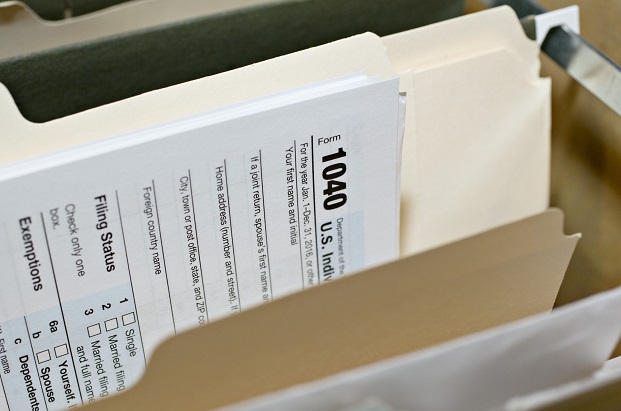 Even among those who did get refunds, Treasury data shows the average amount dropped to $1,949, compared with $2,135 in 2018. (Photo: Bloomberg)
Even among those who did get refunds, Treasury data shows the average amount dropped to $1,949, compared with $2,135 in 2018. (Photo: Bloomberg)
Treasury Secretary Steven Mnuchin faces an uphill battle convincing Americans that smaller tax refunds don't necessarily mean they paid more taxes for the whole year.
The number of tax refunds issued so far this year — the first tax filings since the 2017 tax law was enacted — fell nearly 16 percent to 11.4 million, compared with 13.5 million at the same point in the tax filing season last year, according to Treasury data published on Thursday. Even among those who did get refunds, the average amount dropped to $1,949, compared with $2,135 in 2018.
The data, which reflects the first two weeks of the filing season, has irritated taxpayers who discovered that their refund is smaller than last year's because the new law altered available deductions and credits and revised withholding tables.
Worse off are the taxpayers who count on a refund every year to pay debts or spend on extras and found they owed the government instead.
The confusion adds to the public relations battle about the tax law that Republicans have been fighting since President Donald Trump signed it into law in late 2017. Despite the law cutting individual tax rates and paychecks that were a little higher because of changes to withholding rules, the law has persistently polled below 50 percent.
Democrats, including 2020 presidential candidates such as Senator Kamala Harris, are arguing that the law benefits only the wealthy. More than half the tax law's benefits in 2018 went to households with the top 10 percent of annual income, according to an analysis by the Urban-Brookings Tax Policy Institute.
So the Treasury Department has started working furiously to persuade taxpayers that they really are better off.
“Most people are seeing the benefits of the tax cut in larger paychecks throughout the year, instead of tax refunds that are the result of people overpaying the government,” the Treasury said in a statement Thursday. “Smaller refunds mean that people are withholding appropriately based on their tax liability, which is positive news for taxpayers.”
The General Accountability Office estimated that 21 percent of taxpayers would owe money at filing time under the new law, versus 18 percent under the prior law, because changes in the way withholding is calculated.
Refund checks are often pumped immediately back into the economy, while slightly higher paychecks don't give the feeling of a windfall, economists say.
“People tend to approach their taxes by over-paying throughout the year so that they can generate some extra cash in the form of a refund,” said Gregory Daco, chief U.S. economist at Oxford Economics. “Those who get less will probably cut back on spending because they're not going to have that discretionary money to spend — people react differently to lump-sum payments than to payments throughout the year.”
The data showing that refunds are down only covers the first few weeks of the filing season. But the initial decline puts the Treasury Department on the political defense.
The uncertainty about refunds — and the smaller checks — could also pile on to weak consumer spending as taxpayers grow more cautious. U.S. retail sales unexpectedly fell in December, marking the worst drop in nine years, according to Commerce Department data.
It's not yet clear exactly how many taxpayers will get a tax cut this year.
The Urban-Brookings Tax Policy Center projects about 80 percent of people will get a tax reduction. The Treasury Department has not yet begun tracking how liabilities compare to last year, according to a department official.
The IRS has been off to a slow start this filing season after a 35-day government shutdown left the agency with a fraction of its staff just before the filing season launched Jan. 28.
Taxpayers, too, have been slower to file this year. The IRS has received about 7 percent fewer returns at this point in the filing season compared with a year ago.
The IRS is urging taxpayers who unexpectedly owe money to pay what they can if they can't cover the whole liability at once. The agency has payment plan options for people in that situation. The IRS has also waived some penalties for those who didn't have enough withheld out of their paycheck during the year.
READ MORE:
10 new tax numbers to know for 2019
Everything you need to know about the new IRS employer tax credit
© 2025 ALM Global, LLC, All Rights Reserved. Request academic re-use from www.copyright.com. All other uses, submit a request to [email protected]. For more information visit Asset & Logo Licensing.







